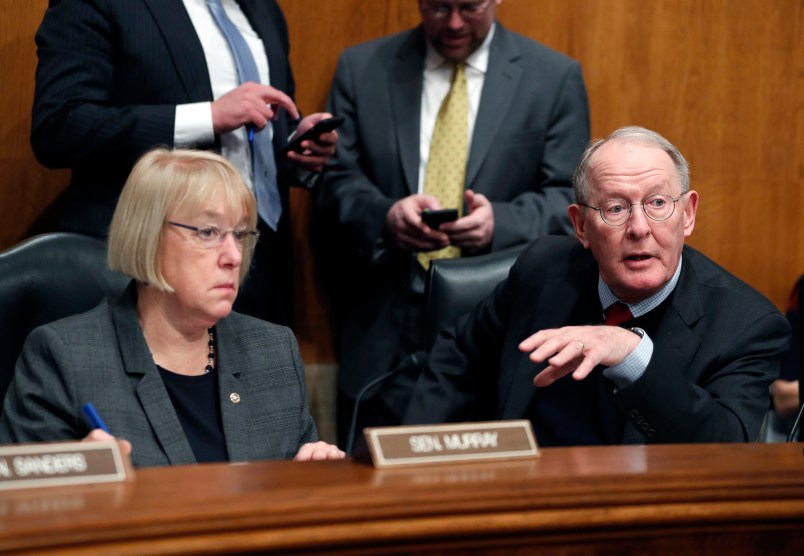Senators who have been working for months on a bipartisan bill to stabilize Obamacare’s individual market and take away one of President Trump’s ways to sabotage it are throwing in the towel, saying the GOP’s last-minute effort to repeal the Affordable Care Act has ruined their chance of passage.
Health, Education, Labor and Pensions committee chair Sen. Lamar Alexander (R-TN) announced Tuesday evening in a written statement that he has “not found the necessary consensus” to advance his bill.
The news broke a few hours after House Speaker Paul Ryan (R-WI) and the White House told Senate leaders on Tuesday that they oppose the stabilization bill and want all efforts focused on repeal.
“It obviously makes it more difficult. That’s disappointing,” Alexander told reporters earlier in the day, before his written statement. “I know how to get bipartisan results but I’m not a magician. To get a bipartisan result on this before the end of September would mean I’d have to persuade 10 or 15 of my Republican colleagues, persuade Senator McConnell to put it on the floor, the House to pass it and the president to sign it.”
“A week ago, I think that was possible,” Alexander added wistfully, arguing that both Democrats’ decision to introduce a “Medicare-for-All” bill and Republicans’ 11th hour repeal push “obviously makes achieving a bipartisan consensus more difficult.”
(A Democratic Senate aide pushed back on Alexander casting blame on the single payer effort, telling TPM that Medicare-for-all is an eventual goal, while stabilizing the health care system is an immediate action Democrats support.)
Walking through the basement of the Capitol building, a grave-faced Alexander urged President Trump and Speaker Ryan to “reconsider their opposition,” arguing that his stabilization bill is not mutually exclusive with the Graham-Cassidy repeal bill.
“It will help keep premiums down in the first two years of the law,” he said, noting that much of the repeal bill doesn’t go into effect until 2020. “When we don’t have cost-sharing subsidies, we know that premiums go up, the federal debt goes up to pay for the higher subsidies for the premiums, about 5 percent of counties will be bare counties with no insurance offered, that’s about 1 million Americans, and Republicans will get the blame.”
Alexander added that while he supports the Graham-Cassidy repeal bill—saying, “I like block grants and it appears to be good for Tennessee”—he would have preferred a vote on both bills.
“I think most senators would vote for both,” he insisted.
Other members of Alexander’s committee shared a sunnier view of the situation Tuesday morning, insisting to reporters that the bipartisan stabilization efforts was not dead yet.
“We’re making good progress,”said ranking member Sen. Patty Murray (D-WA), who for months has been hammering out a deal with Alexander and recently made major concessions to keep the negotiations alive. “I’m focused on doing what Lamar and I set out to do which is find common ground and stabilize the markets.”
Sen. Susan Collins (R-ME), a key member of the HELP committee and an outspoken critic of the repeal push, echoed this optimism, which later revealed itself to be unfounded.
“Last I knew they were making very good progress on an agreement,” she said.










